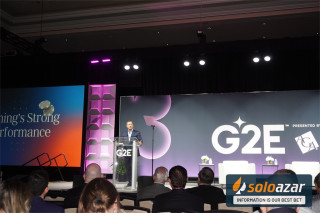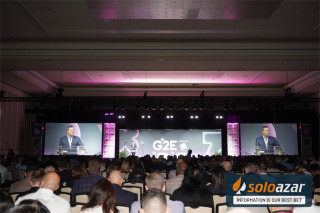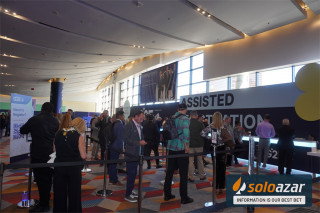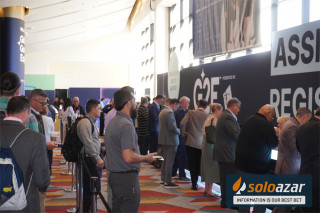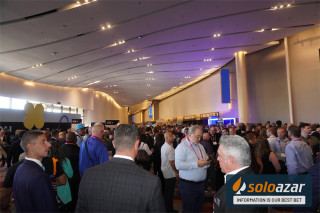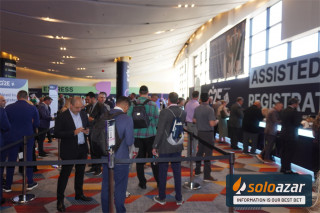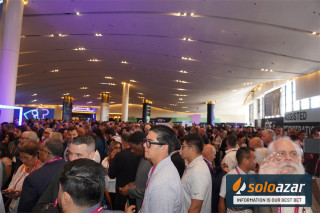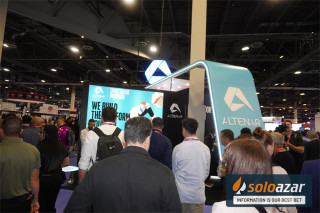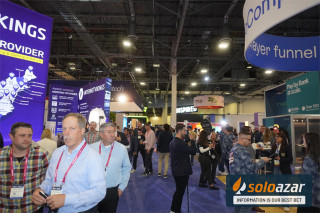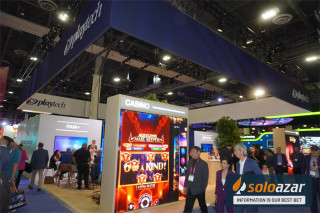Billionaire Stefan Soloviev on why he’s betting USD 3 B on a casino In Manhattan
Tuesday 31 de January 2023 / 12:00
2 minutos de lectura
(Manhattan).- One of America's biggest landowners is locked out on the 6.5-acre vacant lot he owns just south of the United Nations in New York. The 42-story tower his father built casts a long shadow across the street. After a few minutes of fiddling with the lock, Stefan Soloviev enters one of the last large tracts of undeveloped land in Manhattan.

If Soloviev, 47, has his way, he could alter the New York skyline like his late father, real estate mogul Sheldon Solow, did. Solow, the son of a bricklayer who dropped out of college, amassed a $4.4 billion fortune in real estate building an empire of skyscrapers and residential buildings, including the iconic 9 West 57th Street. Soloviev - who uses the original Russian spelling of the family name, in part to distance himself from his father - created his own empire of farmland and railroads in Kansas and Colorado, and it is now worth more than $2 billion.
Now Soloviev is back home to try to win one of the most exclusive prizes in the country: one of three New York casino licenses that the state will soon award to deep-pocketed promoters.
Soloviev wants to transform his property along the East River into what he has dubbed "Freedom Square." The project would include a 1,000-room hotel, two residential towers, a Ferris wheel, a soccer field, a museum dedicated to democracy with large slabs of the Berlin Wall from his personal collection. And, of course, a casino with shops, restaurants, and a concert hall. The company is trying to reach an agreement with a major casino partner, and Soloviev says his firm is willing to invest $3.2 billion in the project.
“This is the most exciting thing in New York right now,” says Soloviev, standing on his barren plot, which used to house a Con Edison power plant until his family business bought it out in a controversial $600 million transaction. in 2000, he razed the buildings and cleared the land. “Again, it's not just a casino; it is an entertainment district. Whether people play or not, this community will attract people and be a hub for the city."
Despite being a New York real estate mogul with casino ambitions, Soloviev is no surrogate for Donald Trump. He has tattoos on his arms and back, and he seems much more comfortable riding a freight train across the plains -- he owns the Colorado Pacific Railroad, which runs through Kansas and into the Centennial State -- than wearing a suit and tie in Manhattan.
Soloviev grew up just a few blocks from the proposed 'Freedom Square' site, and by the time he was in his senior year of high school in 1992 he was already working for his father, who founded and ran the Solow Building Co. until he died at age 92 in 2020. Soloviev started modestly in the family business, parking cars in his father's crown jewel on West 57th Street, the distinctive leaning office building overlooking Central Park. The first car he parked was a disaster. "I didn't know how to drive in low gears and the car spun out of control, but I managed to stop it without crashing," he recalls. "I still know how to park cars in very tight spaces, so if I had to resort to something, I could go back to being a valet."
The following year he attended the University of Rhode Island, but spent most of his time trading commodities such as sugar, then gold, and finally grain. "I was using the pay phone to call a JPMorgan stockbroker," he explains. “But then my father pressured me to drop out and come work for him. He was the only thing we agreed on ».
Back in New York, the former valet began managing all the garages owned by his father. He met a girl at a party in East Hampton, married her, and had one too many fights with her father, after which Soloviev and her new girlfriend headed West. "We had a lot of fights: it was impossible to work with him," Soloviev says of his father.
The newlyweds ended up in Kansas, where Soloviev says he bought his first parcels of land with a subsidized federal loan and started an agricultural business, Crossroads. Over 20 years, he built a conglomerate spanning 400,000 acres of land, growing wheat and corn in the drylands of Kansas and Colorado. In New Mexico, he owns a 300,000-acre cattle ranch that produces 1.5 million pounds of beef a year. In total, he is among the 30 largest farmland owners in the country.
When his father died, Soloviev - who has more than 22 children, though only 11 were named in his father's will - inherited the Solow Building Co. and merged it with his company, creating the Soloviev Group. Last summer he sold a portfolio of his father's apartment buildings for $1.75 billion. In April 2020, he bought a few businesses on Shelter Island, including a trendy hotel, The Chequit. (He also owns hundreds of acres of farmland on the North Fork of Long Island.) Like many Americans during the pandemic, he moved his primary residence to Delray Beach, Florida.
When asked if he's learned anything from his father as he prepares to build a casino in Manhattan, Soloviev doesn't hesitate: "No," he replies as traffic whizzes down FDR Drive. "I have my own style. [I'll make it as dramatic and beautiful as possible.]
But Soloviev isn't the only one trying to convince New Yorkers that his neighborhood needs a casino. Earlier this month, the New York State Gaming Facility Siting Board officially issued a call for applications for up to three new casinos in the southern region of the state (this includes the five boroughs of the city, Westchester and Long Island). The state requires that each proposal commit a minimum capital investment of $500 million, plus at least an additional $500 million for a gaming license. Each bidder must also pay a non-refundable fee of one million dollars to the New York State Gaming Commission just for submitting their bid.
In recent months, New York's richest and most powerful real estate developers have put their cards on the table, revealing ambitious plans to build Las Vegas-style casinos across the five boroughs. Related Companies, developer of Hudson Yards in Manhattan, has partnered with Wynn to build a casino near the Javits Center on Manhattan's West Side. Saks Fifth Avenue owner Hudson's Bay Co. wants to transform the top three floors of its iconic department store near Rockefeller Center into an ultra-chic casino.
SL Green Realty Corp., Jay-Z Roc Nation and Caesars Entertainment expect to bring Caesars Palace to the heart of Times Square.
In January, Vornado, the New York real estate giant, said it is also considering bidding for a casino to replace the famous Hotel Pennsylvania, directly across from Madison Square Garden, which is set to be demolished later this year. “We are looking into the possibility of applying for a casino license, but we don't have any closed deals,” a Vornado spokesperson says.
Then there are the offers from the peripheral neighborhoods. Billionaire Steve Cohen, owner of the New York Mets, wants to build one in the parking lot near CitiField in Willets Point, Queens. Real estate developer Thor Equities announced a $3 billion proposal to bring a casino to Coney Island, on a 5-acre waterfront plot from Surf Avenue to Wonder Wheel Way.
Las Vegas Sands - which sold its two Las Vegas casinos, the Venetian and the Palazzo, to Apollo Management for $6.25 billion in 2021 - also wants to regain a major gaming presence in the United States by building a development billionaire at the Nassau Coliseum on Long Island.
The biggest real estate developers in the city and the biggest gambling companies in the world are fighting for "the holy grail": a casino license in Manhattan.
Beyond the serious competition, a major problem for Soloviev's Freedom Plaza -- and for all would-be New York casinos -- is that the community doesn't want one. Although Soloviev grew up a block away from his vacant lot and his father's buildings dot the neighborhood, Community Board 6, which encompasses Murray Hill, Tudor City and Kips Bay, strongly opposes the project.
"The opposition is overwhelming," says Kyle Athayde, president of Manhattan Community Board 6, adding that the board will "absolutely" use its power to "stop this" project.
"We're used to these kinds of 'lodges,' it's a distraction," says Athayde, who also grew up in the neighborhood. He says the community sees the Ferris wheel, soccer field, and other amenities as "red herrings" created to convince neighbors to give the casino the green light. «All the promoters do it; their tactic is to say, 'We're going to build these nice, income-generating things for ourselves, but we'll give you some green space,'” says Athayde. "We are fed up with these crumbs."
But Michael Hershman, CEO of the Soloviev Group, believes the company can win support from the community. "It's very difficult to build anything in Manhattan without community opposition," he says.
Another hurdle for Soloviev and the other billionaires and real-estate tycoons fighting for a license is that there are supposedly two favorites. Many politicians and industry experts believe that the two racetracks near Manhattan have a great advantage, since they have been operating for years and contributing money to the state coffers. Resorts World New York, in Jamaica (Queens), accessible from the subway and owned by Resorts World Genting, of billionaire Lim Kok Thay, and MGM's Empire City Racetrack, in Yonkers, have racetracks and video slot machines, but no games table like blackjack or roulette. (Resorts World, which had $640 million in revenue last year, is one of the best-performing casinos in the country.) These two locations can quickly become full-fledged casinos.
Nick Antenucci, a lawyer and lobbyist who has worked on behalf of Resorts, says anything can happen in a competitive bidding process, but two of the three licenses go to Resorts World and MGM. "If I were a betting man, we'd be talking about a single license," he says. This means, Antenucci says, that the city's biggest real estate developers and the world's biggest gambling companies are fighting over "the holy grail" - a casino license in Manhattan, which promises to generate billions of dollars in gambling revenue.
Back in his wasteland, Soloviev says he feels more like himself when he is out on the endless plains of the West. But, like any braggart promoter, he doesn't think he can lose. What will happen to the land between 38th and 41st streets if he doesn't get a casino license? "I'll probably make a marijuana farm," Soloviev says, joking. “We have one goal: to win.”
Categoría:Casino
Tags: casino,
País: United States
Región: North America
Event
G2E - Las Vegas 2025
06 de October 2025
CT Interactive on Innovation, Networking, and Market Growth at G2E 2025
(Las Vegas, SoloAzar Exclusive).- The global gaming industry marked G2E’s 25th anniversary with a major gathering in Las Vegas. CT Interactive stood out for its innovative product development and international growth strategy. Account Manager LATAM at CT Interactive, Roberto Muñoz, shared insights on G2E’s importance, emerging trends, and the company’s collaborative expansion efforts.
Thursday 30 Oct 2025 / 12:00
Atlaslive Explored the Future of Gaming in Latin America at Recent G2E 2025
(Las Vegas, SoloAzar Exclusive).- Bruno Almeida, Head of Sales LATAM at Atlaslive, attended G2E for the first time to explore how land-based and online gaming are converging. His experience highlighted key trends shaping the Latin American market, from immersive casino innovations to strategic networking and regulatory insights.
Monday 27 Oct 2025 / 12:00
G2E 2025: Cristian Galarza, ASAP Director Explains the Importance of Attending the Event
(Las Vegas, SoloAzar Exclusive). - After attending the 25th anniversary edition of G2E in Las Vegas, ASAP’s director shares his perspective on the evolution of the industry, driven by digitalization, efficiency, and the creation of international networks that foster new business opportunities.
Tuesday 28 Oct 2025 / 12:00
SUSCRIBIRSE
Para suscribirse a nuestro newsletter, complete sus datos
Reciba todo el contenido más reciente en su correo electrónico varias veces al mes.


















